Desperate to stop virus' spread, countries limit travel
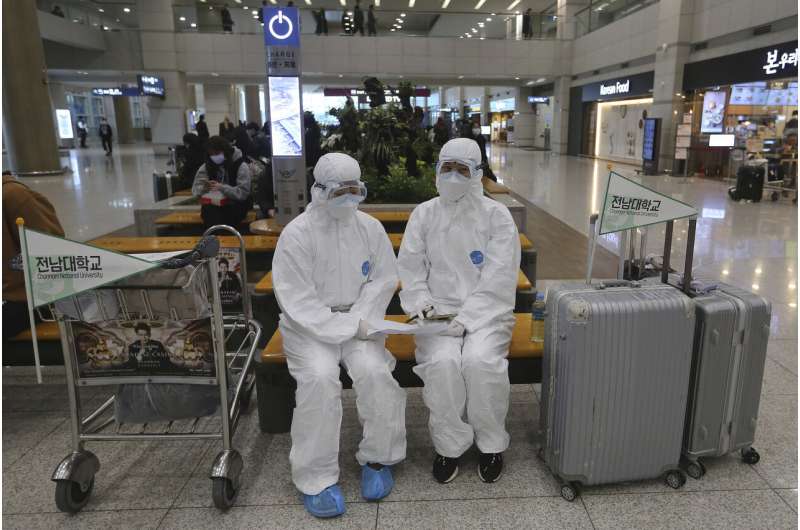
Officials scrambled Tuesday to halt the spread of the burgeoning new virus, from northern Italy where troops were dispatched to enforce quarantines and schools were shuttered, to South Korea, where some neighborhoods in a city of 2.5 million were brought to a near standstill.
New clusters of the illness popped up far from its apparent point of origin in China, fueling apprehension in world financial markets and political institutions. The spread fueled an increased sense of urgency among officials in some of the wealthiest nations in Europe and Asia, as well as in countries like Iran, with far fewer resources to stem the disease. But many remained uncertain about how best to contain it.
"It's a matter of speed and time: We must create a clear turning point within this week," said President Moon Jae-in of South Korea, where the caseload grew by 144, with a total of 977 people sickened.
Cases of people who could have infected many others spurred fears.
Korean Air said one of its crew members tested positive, but the airline didn't disclose the flights the employee had worked on. On a U.S. military base in Daegu, the center of infections in South Korea, officials said a 61-year-old widow of a U.S. service member had also been infected. It was the first known case among people related to the thousands of U.S. troops stationed in the country. And in the tiny Persian Gulf nation of Bahrain, one of those infected was a school bus driver who had transported students as recently as Sunday.
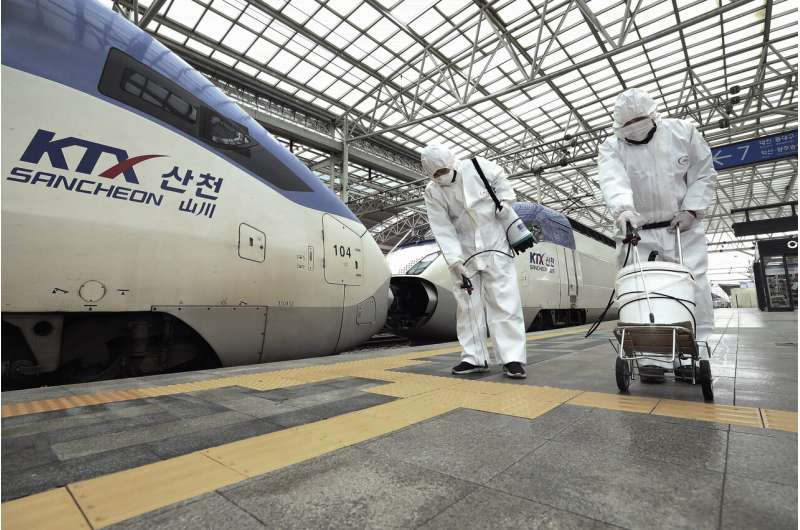
Also testing positive was the head of Iran's virus task force, who just a day earlier gave a news conference in Tehran in which he tried to minimize the danger posed by the outbreak.
In Italy's north, where more than 200 people were sickened, a dozen towns were sealed off and police wearing face masks patrolled.
Two neighbors of Italy—Croatia and Austria—reported their first cases of the virus. And an Italian doctor staying at a hotel in the Canary Islands tested positive for the virus, prompting the quarantine of hundreds of guests.
Croatia, Hungary and Ireland advised against traveling to Italy's affected area, one of a number of government moves seeking to limit further exposure. Bahrain suspended flights to Dubai while the United States' Centers for Disease Control and Prevention issued its highest travel alert on South Korea, advising citizens to avoid nonessential trips. Japan also urged citizens to avoid unessential travel to South Korea's hardest-hit areas.
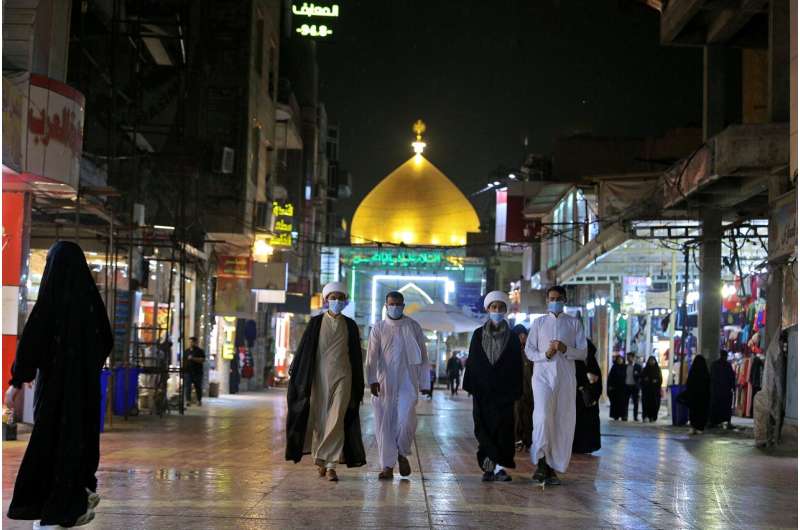
A culture of long days at the office in Japan came to terms with the outbreak, with the government urging employers to allow workers to telecommute and have more flexible hours, simple moves Japanese Prime Minister Shinzo Abe expressed hope could help control the spread.
"We are at an extremely important time in ending the spread of infection at an early stage," Abe said at a meeting of a task force on the outbreak.
Even in places where no cases have sprouted up, leaders kept a wary eye, such as in Denmark, where two former military barracks were being prepared as quarantine centers. Still, uncertainty remained about how to effectively limit the epidemic.
Italy had taken Europe's most stringent preventative measures against COVID-19, the disease caused by the virus, and yet became home to the biggest outbreak outside Asia. Experts in Japan, with one of the world's most sophisticated health systems, acknowledged the country's handling of the virus-stricken Diamond Princess cruise ship was flawed and could have allowed the problem to magnify.
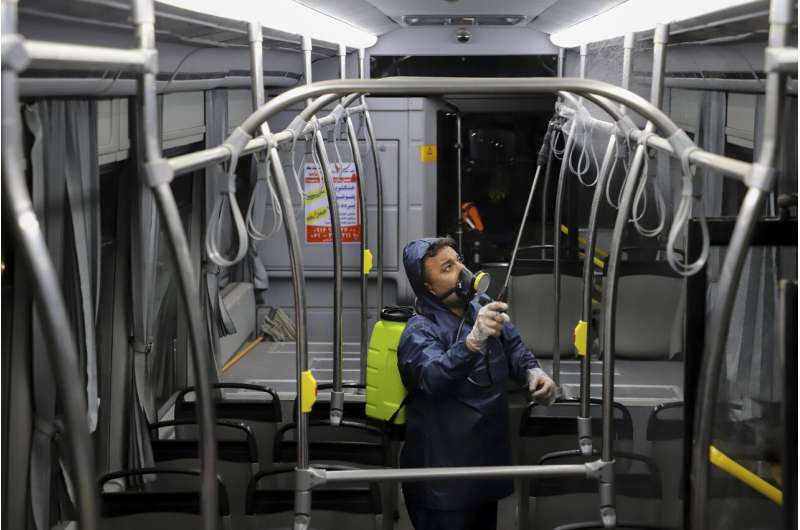
In comments reflecting both defiance and dubiousness over what measures work, French health minister Olivier Veran said the country would not shut its border or call off mass gatherings.
"We don't close borders because we would not be able to, we don't do it because it would be meaningless," he said on French radio RTL. "Should we ban gatherings? Should we stop the Fashion Week? Should we suspend matches? Should we close universities? The answer is no."
China reported 508 new cases and another 71 deaths, 68 of them in the central city of Wuhan, where the epidemic was first detected in December. The updates bring mainland China's totals to 77,658 cases and 2,663 deaths.
The World Health Organization said Monday the fatality rate was between 2% and 4% in Wuhan and 0.7% elsewhere in China.
Dr. Bruce Aylward, the WHO envoy who led a team just back from China, told reporters Tuesday the reason for the large discrepancy was partly because the disease hit Wuhan early and fast, when "people didn't know what we were dealing with, were learning how to treat this."
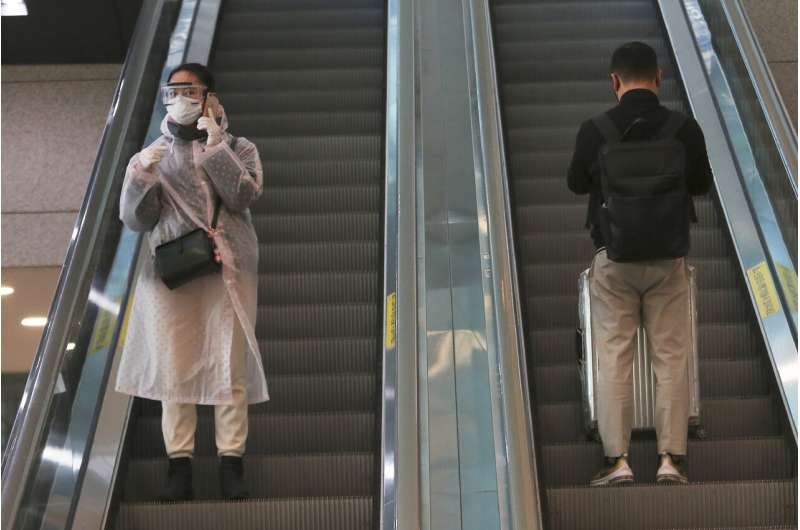
At the beginning of the outbreak, "people were finding severe disease, that's why the alarm bell went off," Aylward said. But now with more aggressive testing, mild cases are being diagnosed and isolated.
Still, he expressed frustration at people saying, "'Oh, the mortality rate's not so bad because there's way more mild cases.' Sorry, the same number of people that were dying, still die."
While China remains home to the vast majority of cases, the world's attention has increasingly moved to where the outbreak would spread next. Iran was eyed as a source for new transmissions in the Middle East, including in Iraq, Kuwait and Oman, which were grappling with the spread past their borders.
In South Korea's southeastern city of Daegu and surrounding areas, panic over the virus has brought towns to an eerie standstill. The country reported its 11th fatality from COVID-19 amid signs, big and small, of the problem that has magnified nearly 15-fold in a week.
-
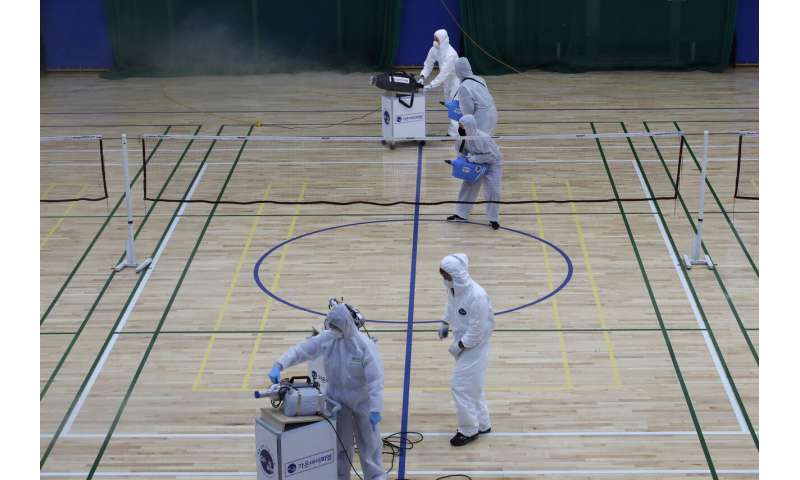
Workers in protective suits spray disinfectant as a precaution against the COVID-19 at an indoor gymnasium in Seoul, South Korea, Tuesday, Feb. 25, 2020. China and South Korea on Tuesday reported more cases of a new viral illness that has been concentrated in North Asia but is causing global worry as clusters grow in the Middle East and Europe. (AP Photo/Lee Jin-man) -

A worker wearing protective gears sprays disinfectant as a precaution on a train against the new coronavirus at Suseo Railway Station in Seoul, South Korea, Tuesday, Feb. 25, 2020. China and South Korea on Tuesday reported more cases of a new viral illness that has been concentrated in North Asia but is causing global worry as clusters grow in the Middle East and Europe. (Lee Ji-eun/Yonhap via AP) -
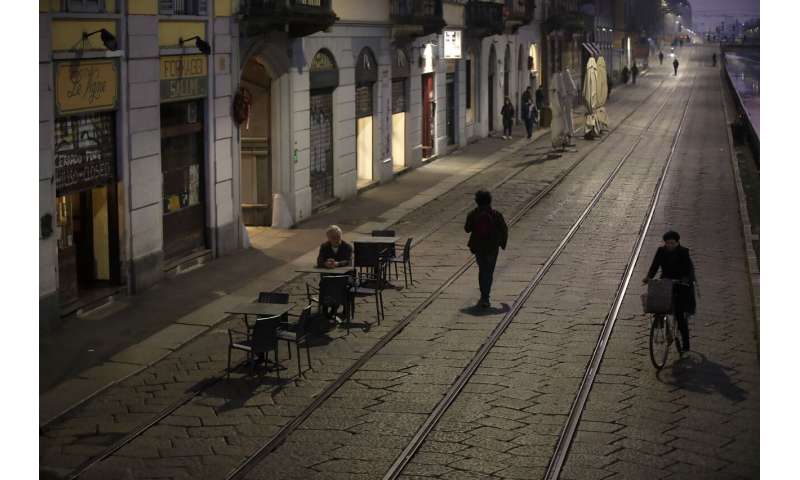
A man sits alone outside a bar at the Naviglio Grande canal in Milan, Italy, Monday, Feb. 24, 2020. Italy has been scrambling to check the spread of Europe's first major outbreak of the new viral disease amid rapidly rising numbers of infections, calling off the popular Venice Carnival, scrapping major league soccer matches in the stricken area and shuttering theaters, including Milan's legendary La Scala. (AP Photo/Luca Bruno) -
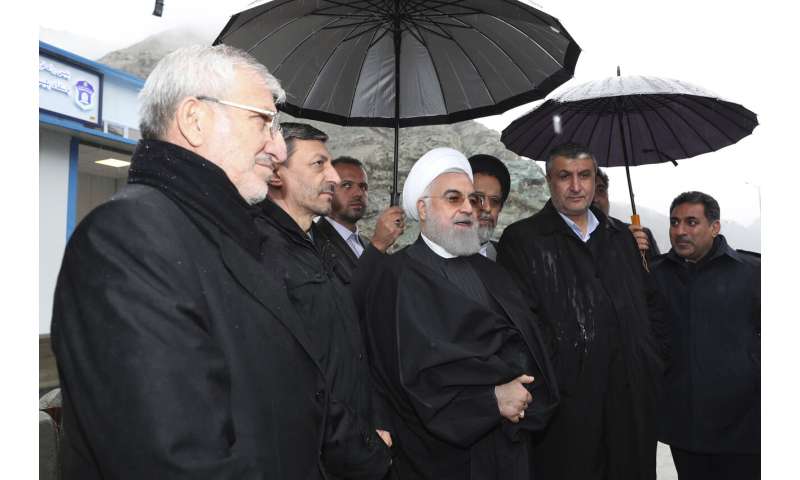
In this photo released by the official website of the office of the Iranian Presidency, President Hassan Rouhani, center, speaks while visiting a new highway that connects Tehran to the north of the country, Iran, Tuesday, Feb. 25, 2020. Rouhani sought to reassure the nation in a speech on Tuesday, calling the new coronavirus an "uninvited and inauspicious passenger." "We will get through corona," Rouhani said. "We will get through the virus." (Iranian Presidency Office via AP) -
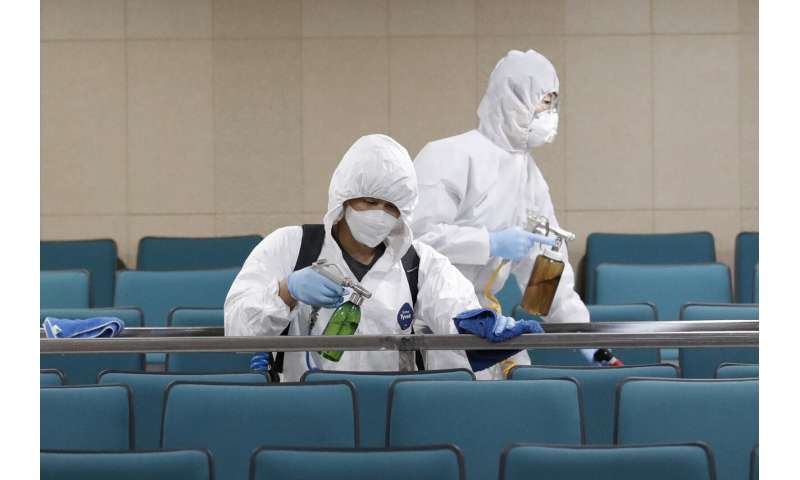
Workers in protective suits spray disinfectant as a precaution against the COVID-19 at an indoor gymnasium in Seoul, South Korea, Tuesday, Feb. 25, 2020. China and South Korea on Tuesday reported more cases of a new viral illness that has been concentrated in North Asia but is causing global worry as clusters grow in the Middle East and Europe. (AP Photo/Lee Jin-man) -

Workers wearing protective gears spray disinfectant as a precaution against the new coronavirus at Korean Air's Incheon Operation Center at Yeongjong Island, South Korea, Tuesday, Feb. 25, 2020. China and South Korea on Tuesday reported more cases of a new viral illness that has been concentrated in North Asia but is causing global worry as clusters grow in the Middle East and Europe. (Choe Jae-koo/Yonhap via AP) -
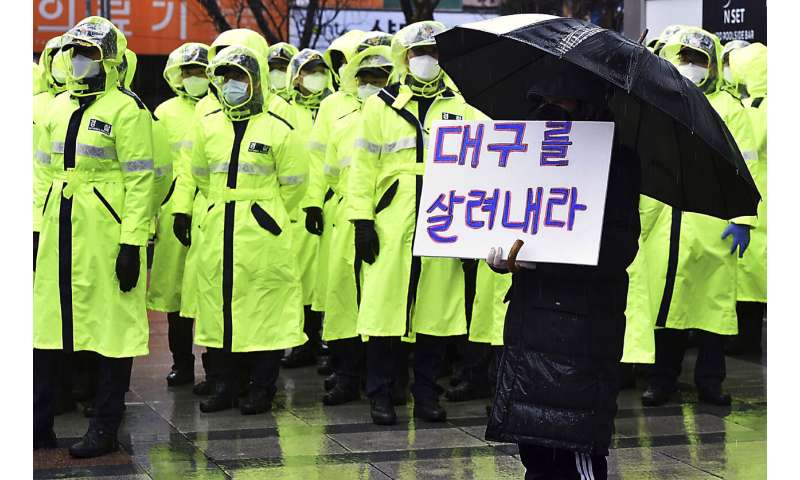
A protester holds a sign to denounce government's coronavirus responses in Daegu, South Korea, Tuesday, Feb. 25, 2020. China and South Korea on Tuesday reported more cases of a new viral illness that has been concentrated in North Asia but is causing global worry as clusters grow in the Middle East and Europe. The signs read "Save Daegu."(Lee Moo-ryul/Newsis via AP) -
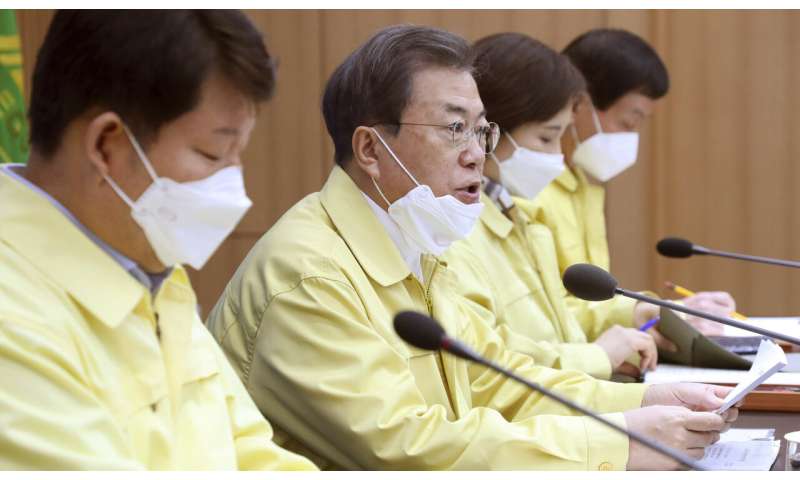
South Korean President Moon Jae-in, second from left, speaks during a special government meeting to discuss measures to prevent the further spread of COVID-19 at the Daegu City Hall in Daegu, South Korea, Tuesday, Feb. 25, 2020. China and South Korea on Tuesday reported more cases of the new viral illness that has been concentrated in North Asia but is causing global worry as clusters grow in the Middle East and Europe. (Han Sang-kyun/Yonhap via AP) -
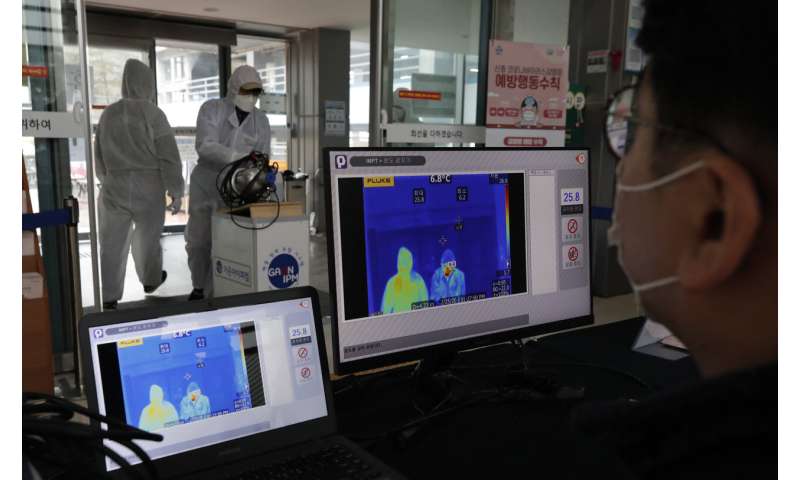
A thermal camera monitors shows the body temperature of people at the gate of an indoor gymnasium in Seoul, South Korea, Tuesday, Feb. 25, 2020. China and South Korea on Tuesday reported more cases of a new viral illness that has been concentrated in North Asia but is causing global worry as clusters grow in the Middle East and Europe. (AP Photo/Lee Jin-man) -
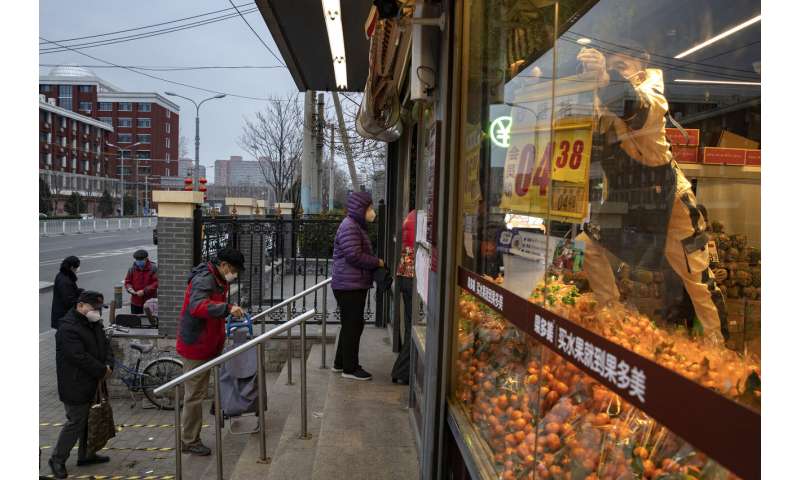
A worker hangs up a price tag for oranges as residents wearing masks line up to enter the supermarket which is controlling the numbers of shoppers in Beijing, China on Tuesday, Feb. 25, 2020. The new virus took aim at a broadening swath of the globe Monday, with officials in Europe and the Middle East scrambling to limit the spread of an outbreak that showed signs of stabilizing at its Chinese epicenter but posed new threats far beyond. (AP Photo/Ng Han Guan) -
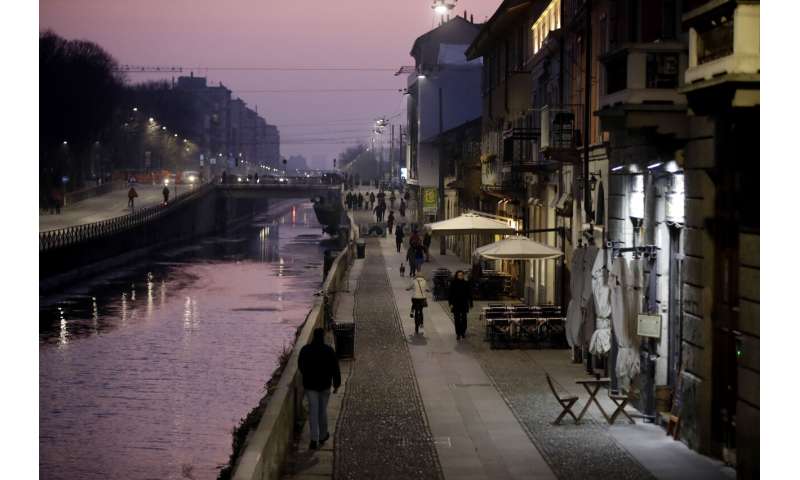
Empty bars and pubs at the Naviglio Grande canal in Milan, Italy, Monday, Feb. 24, 2020. Italy has been scrambling to check the spread of Europe's first major outbreak of the new viral disease amid rapidly rising numbers of infections, calling off the popular Venice Carnival, scrapping major league soccer matches in the stricken area and shuttering theaters, including Milan's legendary La Scala. (AP Photo/Luca Bruno) -
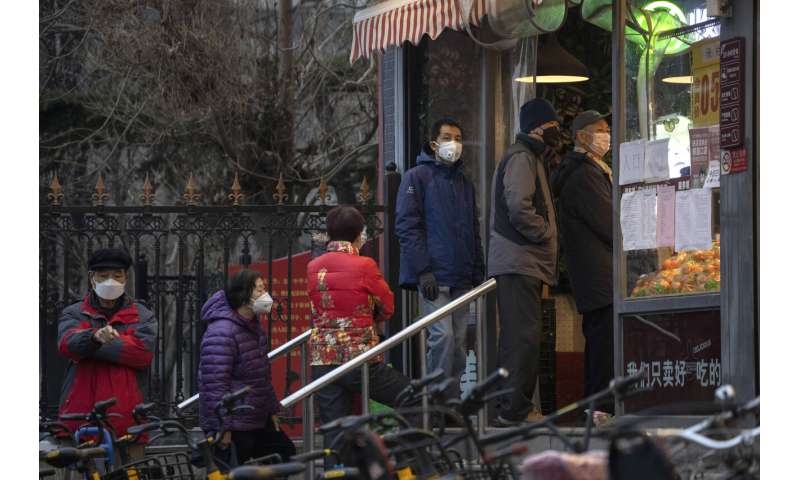
Residents wear masks and line up to enter a supermarket which is controlling the numbers of shoppers in Beijing, China on Tuesday, Feb. 25, 2020. The new virus took aim at a broadening swath of the globe Monday, with officials in Europe and the Middle East scrambling to limit the spread of an outbreak that showed signs of stabilizing at its Chinese epicenter but posed new threats far beyond. (AP Photo/Ng Han Guan) -

Fans wearing masks pose for photos before the start of a concert by Japanese girl group Perfume outside Tokyo Dome in Tokyo, Tuesday, Feb. 25, 2020. Japan's Prime Minister Shinzo Abe said Tuesday that new measures like companies letting their employees work from home and hospitals expanding their capacity to treat many patients will determine if Japan could control its coronavirus outbreak. (AP Photo/Jae C. Hong)
Health officials said they were working to finish testing hundreds of members of a church that has the country's biggest cluster of infections. The church agreed to hand over a list of 200,000 members nationwide so screenings could widen.
"We are creating and refining our system as we go along," said Dr. Kim Jin-hwan of Keimyung University Dongsan Medical Center in Daegu.
South Korea's professional basketball league said it will ban spectators until the outbreak is under control, while Busan City said the world team table tennis championships it planned to host in March would be postponed until June.
South Korea's military confirmed 13 troops had contracted the virus, resulting in quarantines for many others and the halting of field training.
© 2020 The Associated Press. All rights reserved. This material may not be published, broadcast, rewritten or redistributed without permission.



















